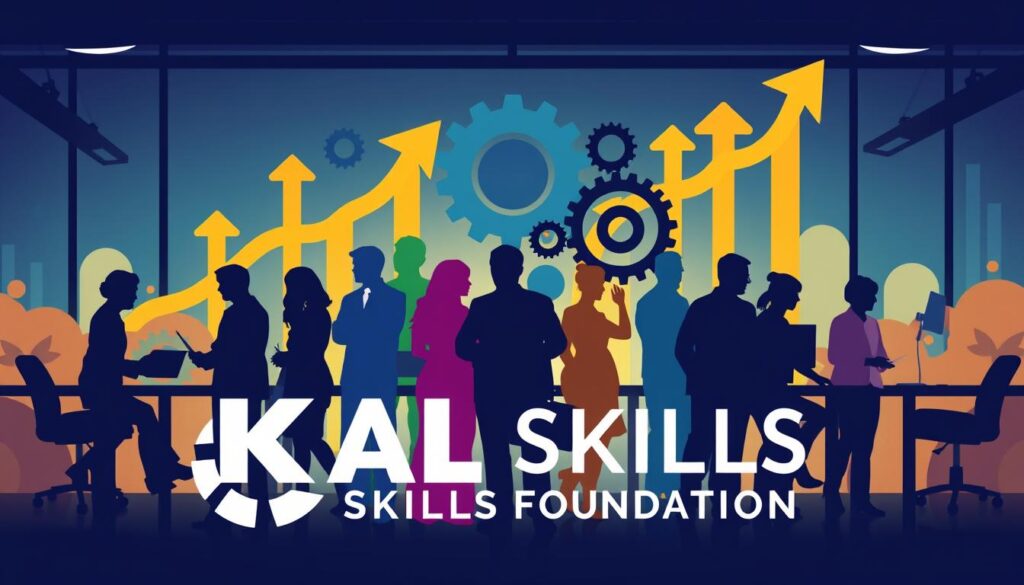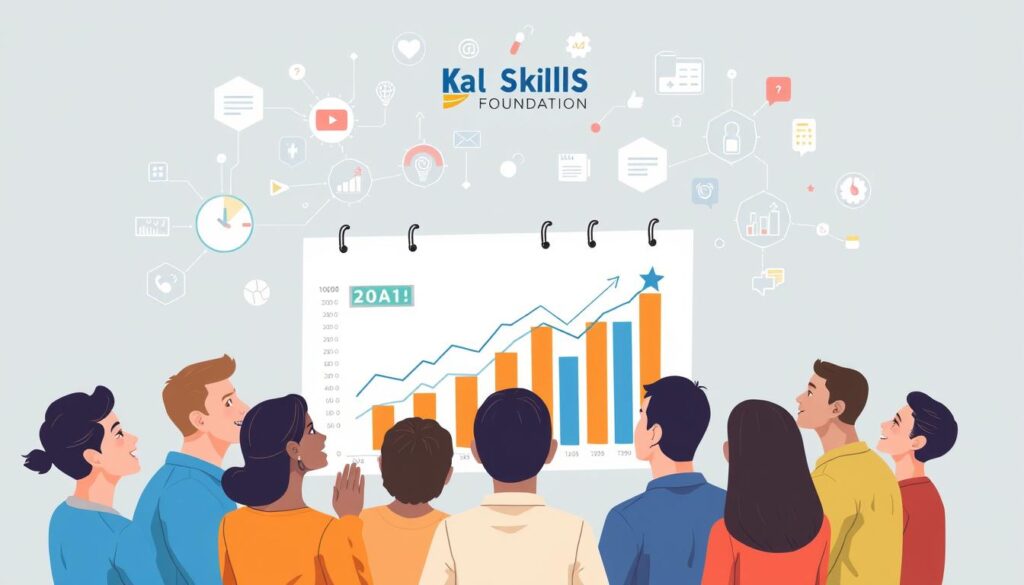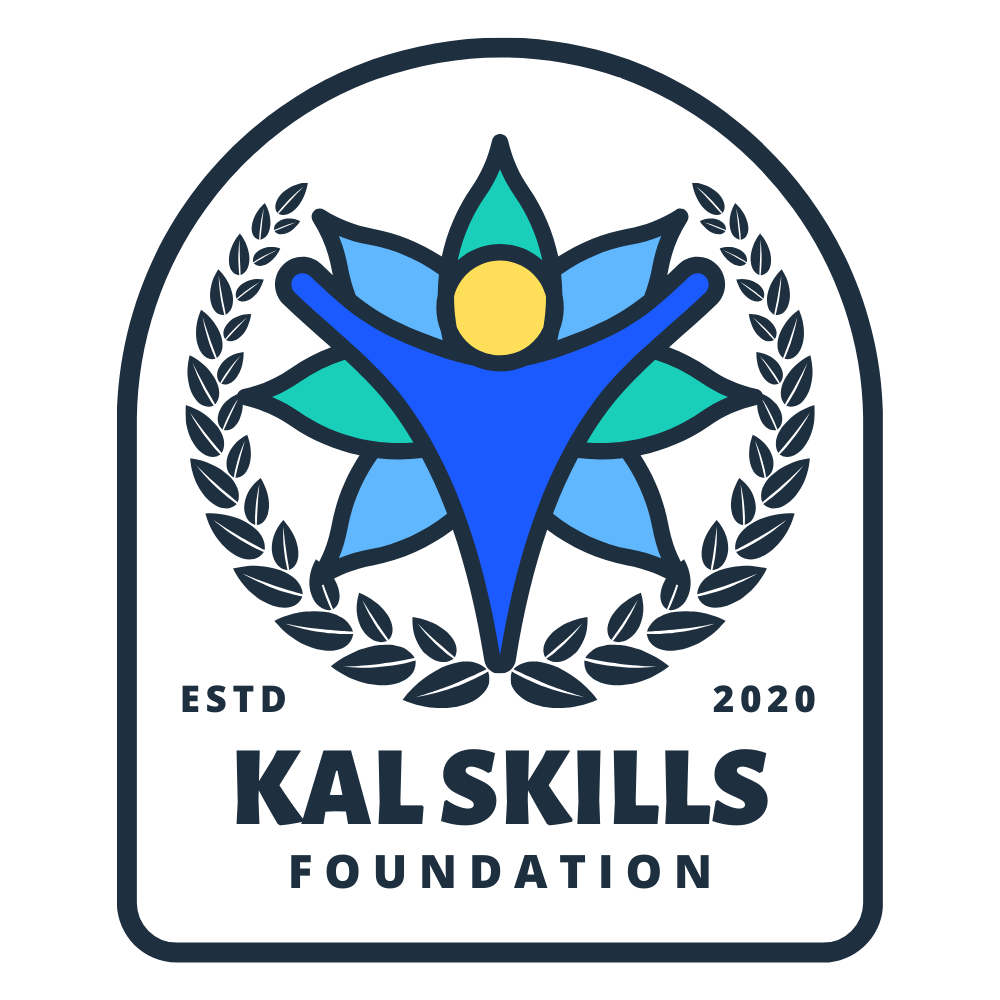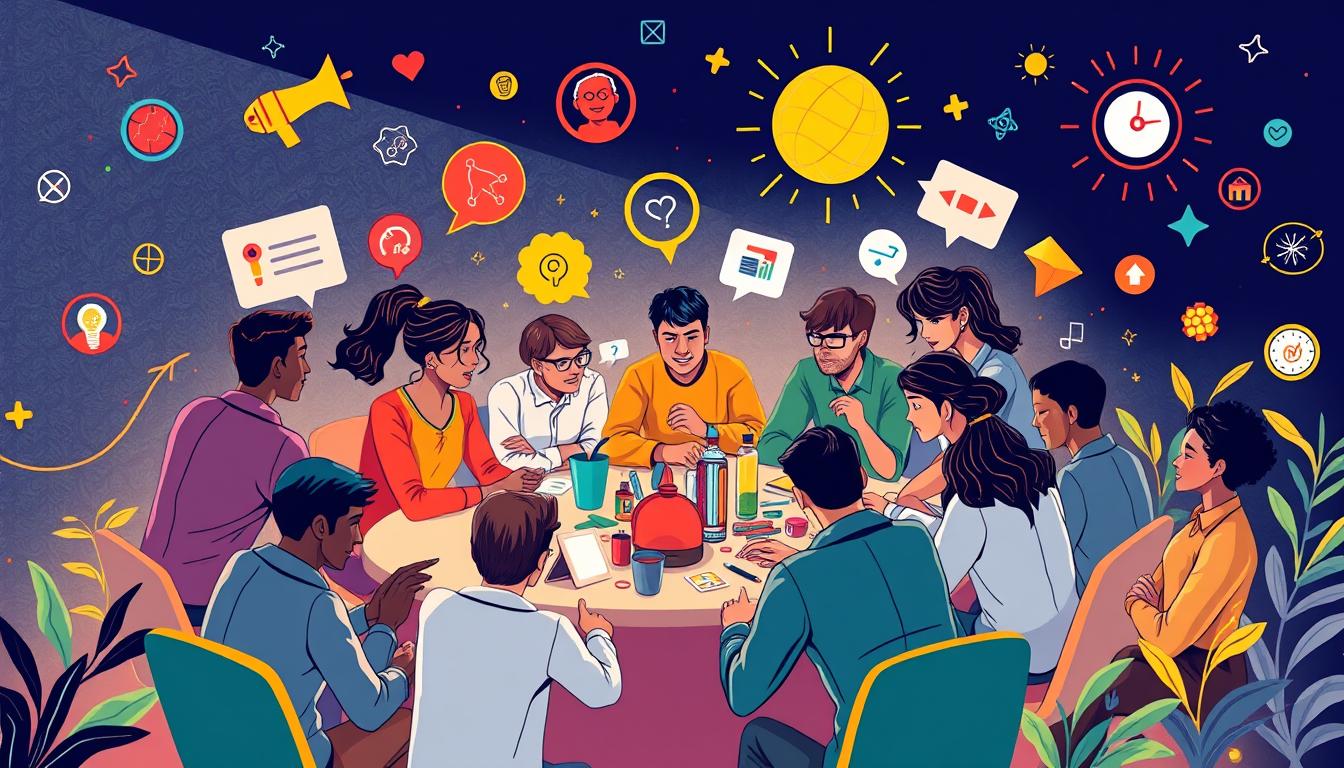Ever wondered why some professionals move up faster in their careers? It’s often because of their people skills. These professional skills help you communicate well and build strong teams. They also boost your leadership abilities.
In today’s fast-paced work world, improving your people skills is key. Studies show that 85% of job success comes from soft skills, not just technical ones1. This means focusing on your people skills is crucial for career growth.
Whether you’re new to your job or looking to improve, learning about people skills can change your career and work environment. We’ll share tips to help you improve your team skills and build lasting connections.
Key Takeaways
- Mastering people skills is essential for career advancement.
- Understanding professional communication can enhance workplace relationships.
- Team building is significantly influenced by effective collaboration.
- Emotional intelligence plays a key role in leadership development.
- 85% of job success stems from well-developed soft skills, emphasizing the need for skill building.
- Engaging in continuous learning can further strengthen your people skills.
Understanding People Skills in the Workplace
People skills are key for a good work environment. They include talking well, understanding emotions, and working together. By 2030, jobs will need more of these skills because of automation2. Good communication and smart choices are also crucial3.
Being able to manage feelings is important for getting along with others. Good relationships come from listening well, caring, and showing real interest in others. Asking thoughtful questions and talking in a way that connects people helps create a supportive space2.
Being able to change how you talk to fit the situation is helpful3. Being patient, supportive, and respectful makes a team work better together. Companies are now focusing more on these skills to make workplaces better for everyone2.
| People Skills | Description | Importance in the Workplace |
|---|---|---|
| Emotional Intelligence | Ability to manage emotions | Enhances interpersonal relationships and collaboration |
| Effective Communication | Includes listening and asking questions | Leads to better outcomes and clearer understanding |
| Active Listening | Listening without interruption and responding thoughtfully | Strengthens relationships and fosters trust |
| Collaboration | Working effectively towards shared goals | Essential for teamwork and project success |
| Flexibility | Adapting communication to different contexts | Improves interactions in diverse situations |
| Flexibility | Adjusting priorities and approaches as needed | Helps navigate changes in the workplace |
The Importance of Effective Professional Communication
Effective communication is key in any work setting. It helps build trust and understanding among team members. Leaders and team members who communicate well create a positive work environment. This environment encourages teamwork and new ideas.
Effective communication is especially important for leaders. It helps them connect with their team, build trust, and work towards common goals. Leaders like Martin Luther King Jr., Ronald Reagan, and Barack Obama knew this well4. With more people working from home, these skills are more crucial than ever5.
Building Relationships through Communication
Building strong relationships through communication is more than just talking. It’s about listening and understanding each other. Skills like adaptability, empathy, and transparency are essential for leaders. They help inspire and bring teams together.
Empathy is key for leaders to connect with their team. This connection creates a better work environment4. Being transparent helps build trust by sharing goals and challenges openly4. These efforts boost morale and engagement, leading to better work performance.
Strategies for Clear and Concise Messaging
To send clear messages, follow these strategies:
- Be direct: Say what you mean without using too much jargon.
- Use visuals: Add charts and images to make your points clear.
- Encourage feedback: Make sure people can talk back to you.
- Tailor your message: Change how you speak based on who you’re talking to.
Good communication can make people happier at work, more confident, and improve how well a team works4. Learning to communicate well can help you trust your leaders more and even advance in your career5.
People Skills: The Foundation of Team Building
People skills are key for building strong teams. They help create a place where trust can grow. Trust is crucial for teams to work better together, be more creative, and support each other more.
When trust is strong, team members feel safe to share ideas. This leads to better performance and creativity in the group6.
Good communication is at the heart of any successful team. It helps build strong relationships between team members. Empathy and listening well help teams face challenges and find new chances6.
It’s everyone’s job to work on teamwork skills. This effort makes the whole team stronger.
Supporting each other is important for growing skills. Being open to different views and backgrounds helps build trust. Regular team activities improve these skills, making communication and decision-making better7.
Trust, teamwork, and clear communication create a place where new ideas can grow. Companies like Adobe, Amazon, and Google show how important these skills are in many fields7.
Enhancing Collaboration Through Team Dynamics
Understanding team dynamics is crucial for effective collaboration. A cohesive work environment is key to productivity and a positive atmosphere. It involves several essential elements.
Creating a Cohesive Work Environment
A cohesive work environment needs shared goals, mutual respect, and open communication. Poor leadership can harm team dynamics, leading to bad communication and negative attitudes. This affects performance8.
Creating a safe space where people feel comfortable taking risks is important. Google’s Project Aristotle shows that psychological safety is key to team success9.
Developing Social Intelligence in Teams
Building social intelligence in teams boosts collaboration. Good communication strategies are vital for team dynamics and conflict resolution. This keeps the environment positive9.
Regularly checking team goals helps keep everyone focused. Using tools like time-tracking software and project management platforms helps teams stay accountable. This improves performance8.
| Key Elements | Description |
|---|---|
| Shared Goals | Alignment on objectives that drive teamwork and collaboration. |
| Mutual Respect | Recognition of each team member’s contributions and values. |
| Proactive Communication | Encouraging open dialogue to prevent misunderstandings and hidden emotions. |
| Psychological Safety | A work environment where team members feel secure to share ideas and take calculated risks. |
Investing in leadership skills can also boost team dynamics. Being flexible in leadership styles can lead to better performance9. By adopting these practices, your team can excel in collaboration.
Leadership Development: Cultivating People Skills
In today’s fast-paced world, leaders must understand people skills well. They need to build strong relationships with their teams to inspire and improve performance. Studies reveal that unhappy staff in the restaurant industry don’t offer great service10. A pushy management style often causes top performers to leave10.
Leaders who treat their staff with kindness and respect earn their trust. This creates a positive work environment, boosting satisfaction and keeping employees. Active listening is key for leaders, especially in small groups or one-on-one talks11. Showing empathy helps create a safe space where employees feel free to share their true selves11.
Great leaders nurture talent in their teams. They see each person’s unique strengths and place them where they can excel10. They mix team members to create balanced teams that meet the organization’s needs10. Leaders also help their team grow by changing habits that hold them back10.
Building teamwork is vital for success and innovation. Encouraging informal relationships helps share knowledge and fosters a learning culture11. Leaders who share a clear purpose can motivate their teams to work towards common goals11.
The Role of Emotional Intelligence in Leadership
Emotional intelligence greatly affects your leadership skills. It helps you understand and control your emotions. This skill is key for managing relationships and making empathetic decisions.
In today’s fast-paced world, leaders with high emotional intelligence excel. They adapt, communicate well, and solve conflicts effectively.
Understanding Your Emotions and Their Impact
Research shows 71 percent of employers value emotional intelligence more than technical skills12. It includes self-awareness, self-regulation, motivation, empathy, and social skills. These are the basics of good leadership13.
Leaders with empathy skills do much better in coaching and decision-making12. A lack of self-awareness can hurt team performance12. Yet, only 10 to 15 percent of people truly know their emotional and behavioral tendencies12.
To improve emotional intelligence, use self-assessment and self-regulation. Emotional intelligence helps in making better decisions and managing stress13. Unresolved conflicts can waste a lot of time and resources12.
Emotional intelligence is crucial for a respectful workplace. Seventy-two percent of employees value being treated with respect for job satisfaction12. Focusing on emotional intelligence in leadership can boost team performance and productivity.

Team Building Activities That Strengthen Bonds
Team building activities are key to building strong bonds and boosting employee engagement. They lay the groundwork for better teamwork and collaboration. Companies that invest in these activities see big benefits, making it a top priority for their teams14.
Popular Team Building Exercises
There are many team building activities that focus on bonding and engagement. Some popular ones include:
- 3 Question Mingle: Helps team members understand each other better.
- 9 Dimensions Team Building Activity: Builds trust by evaluating performance in nine areas.
- Awareness Circle: Encourages non-verbal interaction, helping introverts join in.
- Four Quadrants Activity: Boosts creativity and sharing, great for diverse teams.
These activities improve relationships and communication, leading to better teamwork14.
Benefits of Outdoor and Community Service Activities
Outdoor and community service activities boost employee engagement and personal growth. Simpli5 found that a third of employees might leave due to bad team vibes. Community projects can fix this, promoting teamwork and a shared goal15.
Cornell University research shows that sharing meals improves work performance. Creative activities like singing also help teams bond faster than usual ones15. These activities make the workplace better and help team members connect on a deeper level.
Professional Skills and Their Impact on Team Performance
Professional skills are key to a team’s success in any organization. A study shows 72% of employees don’t fully get their company’s strategy. This highlights the need for clear communication and strategy16. Setting goals using the SMART criteria helps keep tasks clear and everyone on the same page16.
It’s important to have a shared document for team tasks and roles. Using frameworks like DACI helps clarify roles in decision-making. This boosts a team’s effectiveness16. Employees with good emotional intelligence and teamwork skills do better in teams16.
Good communication, listening, and feedback are essential for strong teams. Research shows these practices improve team unity16. The 2023 LinkedIn Workplace Learning Report also stresses the importance of skill development for future workforces17.
Yet, only 26 percent of employees feel their companies challenge them enough to learn new skills. This shows a big gap17. Companies with engaged employees are 21 percent more profitable, showing a link between development and success17.
In today’s data-driven world, analytics skills are crucial. They help improve job performance and solve problems in teams17. Developing skills is a team effort that boosts performance and grows the organization.

Identifying and Nurturing Leadership Potential in Teams
Finding and growing leadership skills is key for any team’s success. It starts with skill assessment methods. By checking team members’ skills monthly, you get a clear view of their abilities18. This helps spot talents that might be hidden otherwise.
Companies like Hearst Magazines and Palo Alto Networks focus on talent development. They help employees grow for the long run. This effort helps build a team ready for big roles19. Leaders who listen well build trust and improve team work and performance19.
The CAR Model (Clarify, Agree, Reinforce) helps team members understand goals better. It promotes growth by asking deep questions18. Also, giving tough tasks helps everyone grow, making sure leaders are ready for the future18.
Good communication is vital for growing leaders. Leaders who are humble draw more followers than those who seem perfect19. Giving feedback helps build confidence and grow skills, making leaders feel ready to lead18.
In short, growing leaders needs a mix of regular checks, support for personal growth, and open talk. With these steps, teams can grow their own leaders.
Conflict Resolution: Tackling Issues Head-On
Effective conflict resolution is key to a happy work environment. Conflicts can actually make relationships stronger and teams more united. But, if not handled well, they can damage how we work together. It’s important to tackle these issues head-on to build trust and boost performance.
Techniques for Effective Conflict Management
Using the right techniques for managing conflicts can help solve problems. Start by understanding and empathizing with others’ views. This means staying calm and willing to find common ground. It’s also important to address feelings at work since unresolved conflicts can slow down progress and creativity20.
Some good strategies include:
- Practicing active listening to grasp everyone’s concerns.
- Keeping communication open to stay clear and honest.
- Using “I” statements to avoid blaming others.
- Staying focused on facts instead of personal opinions.
- Getting everyone involved in solving conflicts.
Creating a Culture of Open Dialogue
Creating a culture where everyone can talk openly is crucial. When people feel safe sharing their issues, conflicts are less likely to grow21. Good communication not only solves problems but also brings in fresh ideas. By knowing each other’s goals, teams can handle conflicts better and work together more smoothly22.
It’s also vital to promote emotional understanding and empathy. This improves how we talk to each other and strengthens our bonds.

Promoting a Positive Organizational Culture
Creating a positive work culture is key to boosting employee morale and productivity. Studies show that happiness at work can increase productivity by up to 12 percent23. This shows how important a supportive and inclusive work environment is for success.
A 2022 survey found that 23 percent of job seekers look for “company values and culture” in job offers23. Companies without a positive culture struggle; 21 percent of job seekers left a job because of it23. It’s clear that a healthy work environment is crucial for keeping and attracting employees.
To build a strong culture, certain skills are needed. Skills like Strategic Mindset, Collaboration, and Driving Vision are essential24. Balance and Boundaries are also key in creating a positive work place24. Emotional intelligence is also vital, as it improves how we interact with each other and boosts the culture24.
Employees can quickly tell if a company’s culture matches their expectations, often in a month or less23. More than half believe that everyone at the company helps shape the culture23. This shows the importance of teamwork in creating a positive work environment.
Ignoring the culture can cost a lot; toxic work environments cost U.S. employers nearly $50 billion each year23. This emphasizes the need for effective change management and ethical skills to build a strong culture24.
| Key Factors | Impact |
|---|---|
| Employee Morale | Enhanced productivity by up to 12% |
| Attraction of Talent | 23% of job seekers consider it critical |
| Retention | 21% leave due to poor culture |
| Turnover Costs | $50 billion annually |
| Employee Contribution | Over half see themselves as culture shapers |
Measuring the Success of People Skills Training Programs
It’s crucial to measure the success of people skills training programs. This ensures they keep getting better. Using measurement metrics helps organizations see how well these programs work. The Carnegie Foundation found that 85% of job success comes from how well people work together25.
Also, 89% of recruiters say a lack of soft skills is why they can’t hire the right people. This shows how important it is to focus on these skills25.
Companies use different ways to teach soft skills, like workshops, online courses, and mentoring. 57% of leaders think soft skills are more important than technical ones26. To really know if these programs work, companies should look at things like training attendance rate, course completion rate, and learner satisfaction rate27.

| KPI | Description | Importance |
|---|---|---|
| Training Attendance Rate | Tracks signups and participation in training sessions. | Indicates engagement and potential value of programs. |
| Course Completion Rate | Measures the percentage of participants who finish their training. | Essential for understanding the effectiveness of session structure. |
| Post-training Assessment Results | Reflect performance improvements post-training. | Critical for evaluating skill retention and application. |
| Training ROI | Calculates financial returns from training investments. | Justifies continued funding for future training initiatives. |
By mixing feedback on teamwork and communication with numbers like customer satisfaction, you get a full picture. It’s key to keep getting feedback to see where to improve. This way, you meet your goals and help your team grow26.
Investing in Continuous Professional Development
Staying ahead in today’s job market means always learning. The world changes fast, and we must keep up. Learning for life helps us grow and move forward in our careers. It’s key to staying relevant and improving our skills.
Without learning chances, 74 percent of workers feel stuck. This shows how important it is for companies to support growth28.
The Advantages of Lifelong Learning
Learning for life brings big benefits for both workers and companies. In 2023, staying sharp is crucial. Employers want people with the right skills to meet their needs29.
Most employees want to stay where they can learn and grow. This shows how vital learning is for keeping people happy and productive28.
Companies that invest in learning see better results. They have happier, more productive teams28. This helps them attract and keep top talent.
Those who keep learning are more excited about their jobs. They’re ready for new challenges. Setting goals, making plans, and finding mentors are key to success29.
Real-Life Examples of Successful Leadership Development
In today’s fast-paced workplace, stories of leadership success show us how to become effective leaders. For example, Bill Gates, co-founder of Microsoft, left Harvard to become a global leader30. His story teaches us the value of taking bold steps towards our dreams.
Marillyn Hewson, former CEO of Lockheed Martin, shows how strategic decisions can lead to success30. Her journey highlights the power of clear communication and planning. Elon Musk, known for Tesla and SpaceX, also shows the value of taking risks for growth30.
Building strong professional networks is key, as Indra Nooyi, former CEO of PepsiCo, has shown30. Her insights show how leaders use relationships to advance. Warren Buffett, CEO of Berkshire Hathaway, also stresses the importance of a long-term vision for lasting success30.
Learning never stops for leaders, as Mary Barra, CEO of General Motors, emphasizes30. Richard Branson, founder of Virgin Group, believes in taking bold steps to grow in leadership30.
Sundar Pichai, CEO of Alphabet Inc., highlights the role of technology in personal growth30. Satya Nadella, CEO of Microsoft, focuses on empathy as a key leadership trait30.
Oprah Winfrey’s success is built on authenticity and personal branding, creating strong connections30. Tim Cook, CEO of Apple, stresses the importance of planning for the future30. Ginni Rometty, former IBM CEO, shows the value of making courageous decisions for success30.
These stories show how leaders use their people skills for growth and inspire others. They remind us that success comes from commitment, communication, and empowering others31.
Conclusion
As we wrap up, let’s focus on the main points of mastering people skills. It’s crucial to improve communication, work well in teams, and develop leadership skills. These skills are vital in today’s job world. They help you succeed in many roles and industries, making you more employable and building better work relationships32.
Learning never stops; improving people skills is a lifelong journey. It requires self-awareness, listening to feedback, and constant practice33. Skills like listening, empathy, and conflict resolution are key. They strengthen work bonds and create a positive work environment. Investing in these areas boosts your growth and your team’s success.
Embracing the path to mastering people skills is essential for success. By striving to get better and using the tips from this article, you’ll build strong connections. You’ll also become a more effective leader and team player.
FAQ
What are people skills and why are they important in the workplace?
How can I improve my professional communication skills?
What role do people skills play in team building?
How can emotional intelligence impact my leadership abilities?
What types of team-building activities can enhance interpersonal relationships?
How can I measure the success of people skills training programs?
Why is continuous professional development crucial for my career?
How can I identify and nurture leadership potential within my team?
What strategies can I use for effective conflict management in my team?
Source Links
- People and Soft Skills for Professional and Personal Success – https://www.coursera.org/specializations/people-and-soft-skills-for-professional-success
- 12 People Skills to Succeed at Work – https://www.coursera.org/articles/people-skills
- The 20 People Skills You Need To Succeed At Work – https://www.forbes.com/sites/jacquelynsmith/2013/11/15/the-20-people-skills-you-need-to-succeed-at-work/
- Why communication is essential to effective leadership – https://lpsonline.sas.upenn.edu/features/why-communication-essential-effective-leadership
- Why Is Effective Communication Important to Career Success? – https://communicationmgmt.usc.edu/blog/improve-workplace-communication
- The Benefits of Team Building to Empower Human Skills – https://www.catalystglobal.com/team-building-to-empower-human-skills/
- Unlocking success with people skills – https://powertofly.com/up/unlocking-success-people-skills
- Master Team Dynamics for Better Collaboration and Productivity – https://everhour.com/blog/team-dynamics/
- Adapting Collaborative Leadership to Team Dynamics and Cultures – https://voltagecontrol.com/blog/adapting-collaborative-leadership-to-team-dynamics-and-cultures/
- Cultivating Leadership – The Clemmer Group – https://www.clemmergroup.com/articles/cultivating-leadership/
- Cultivating People Skills: A Must-Have Leadership Toolkit for the Modern Era – https://www.linkedin.com/pulse/cultivating-people-skills-must-have-leadership-toolkit
- Emotional Intelligence in Leadership: Why It’s Important – https://online.hbs.edu/blog/post/emotional-intelligence-in-leadership
- Emotional Intelligence in Leadership: Your Key to Success – https://nccusa.edu/blog/the-role-of-emotional-intelligence-in-leadership/
- 66 team building activities to bring your team together | SessionLab – https://www.sessionlab.com/blog/team-building-activities/
- 20 Meaningful Team Building Activities for Stronger Teams – https://bonusly.com/post/team-building-activities
- 8 essential teamwork skills – Work Life by Atlassian – https://www.atlassian.com/blog/teamwork/teamwork-skills-accelerate-career
- 7 Skills to Enhance Your Job Performance | HBS Online – https://online.hbs.edu/blog/post/in-demand-skills
- Here’s how you can spot and nurture the potential of your team members. – https://www.linkedin.com/advice/3/heres-how-you-can-spot-nurture-potential-your-team-ctsre
- How to Identify and Nurture the Leadership Potential of Your Employees | Entrepreneur – https://www.entrepreneur.com/leadership/how-to-identify-and-nurture-the-leadership-potential-of/333935
- Leadership Series #5: Leadership and Resolving Conflict – https://www.linkedin.com/pulse/leadership-series-5-resolving-conflict-james-arcieri
- Run Head-On Towards Conflict, Not Away – https://www.linkedin.com/pulse/run-head-on-towards-conflict-away-owen-lafave
- Conflict Resolution Skills – HelpGuide.org – https://www.helpguide.org/relationships/communication/conflict-resolution-skills
- Work Culture: 12 Ways to Create a Positive Environment | Built In – https://builtin.com/company-culture/positive-work-culture
- What are the skills needed to create a positive organizational culture? – https://www.linkedin.com/advice/1/what-skills-needed-create-positive-organizational
- The Crucial Role of Soft Skill Measurement in L&D – https://trainingindustry.com/articles/measurement-and-analytics/the-crucial-role-of-soft-skill-measurement-in-ld/
- Measuring the Effectiveness of Soft Skills Training – https://www.talespin.com/reading/measuring-the-effectiveness-of-soft-skills-training
- 8 Powerful KPIs to Measure Training and Development – Continu – https://www.continu.com/blog/kpi-for-training-and-development
- Why is Professional Development Important? – Professional & Executive Development | Harvard DCE – https://professional.dce.harvard.edu/blog/why-is-professional-development-important/
- The Importance Of Upskilling And Continuous Learning In 2023 – https://www.forbes.com/sites/karadennison/2023/04/13/the-importance-of-upskilling-and-continuous-learning-in-2023/
- 12 Real-Life Examples of How Notable Leaders Navigated Careers | Quire|Quire & You – https://quire.io/blog/p/career-advice.html
- “5 Traits of Great Leaders: Real-World Examples of How to Inspire and Motivate” – https://www.linkedin.com/pulse/5-traits-great-leaders-real-world-examples-how-armstrong-ms-cfo-1c
- Soft Skills – Conclusion – https://www.linkedin.com/pulse/soft-skills-conclusion-john-whitehead-ma-acc-cec-
- How To Develop People Skills – https://www.gethownow.com/blog/how-to-develop-people-skills





